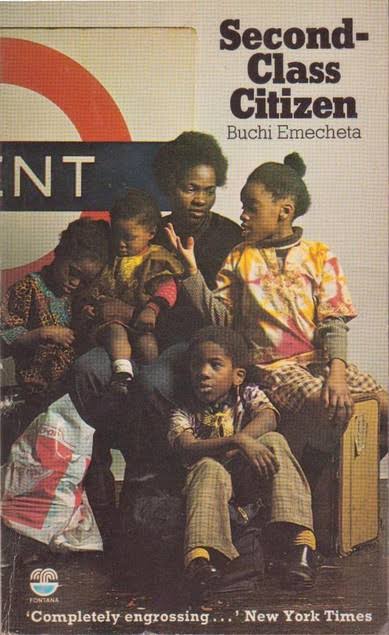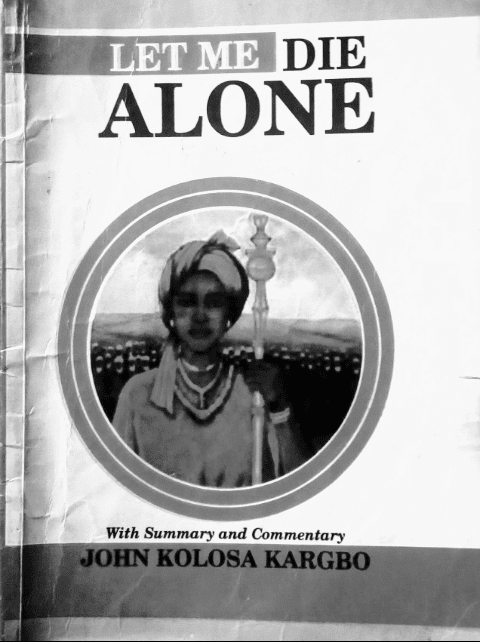Basic Facts
(1) Second Class Citizen is one of the remarkable novels Buchi Emecheta wrote.
(2) It’s one of the two African Prose recommended for Literature-in-English exams in SSCE and JAMB for 2021 – 2025 Syllabus.
(3) Second Class Citizen is a bildungsroman.
Bildungsroman is a type of novel that traces “the spiritual, moral, psychological, or social development and growth of the main character, usually from childhood to maturity”. (Wiktionary)
In the novel, the narrator begins the narration with Adah’s childhood; then traces the story of Adah right from childhood to motherhood. We witness a lot of changes in Adah as the novel progresses, from her growth in social status to her changed perspective about love, marriage, responsibilities and roles.
Other examples of Bildungsroman include Charles Dicken’s David Copperfield, Chinelo Okparanta’s Under the Udala Tree and several more.
(4) Setting: Nigeria and England. In the first few chapters of the text, the setting is Nigeria. The setting changes from Nigeria to England when Adah joins Francis in England.
(5) Language: The language is simple and relatable.
(6) Chapters: The novel is segmented into thirteen chapters.
(7) Second Class Citizen can be categorised as an autobiographical novel. It, in a way, relates the experiences of its author, now under the guise of fiction.
Other works under this category are Ngugi wa Thiong’o’s Weep Not Child and Camara Laye’s African Child.
(8) Principal Character: Adah.
Other noteworthy characters include Francis, Boy, and Pa Noble.
(9) Narrative Technique: Third person narrative technique.
(10) Like most Buchi’s works, Second Class Citizen addresses gender prejudice and in this particular work, racial prejudice.
Other works by Buchi Emecheta include Kehinde, The Slave Girl, The Bride Price and The Joys of Motherhood.
Read Also:
Buchi Emecheta’s SECOND CLASS CITIZEN and Yejide Kilanko’s CHASING BUTTERFLIES: The Point of Convergence
Explaining the Title
The title and concept of “Second Class Citizen” manifests in two folds in the text.
The First Fold has to do with the position of women in the African society. In this case, men are superior while women are inferior.
Using Adah as the archetype of African women, Buchi highlights the role of second fiddle the prototypical patriarchal African society has assigned to women.
They are not seen as the equals to their male counterparts. The society does not believe they have dreams and aspirations too.
Adah’s childhood dreams have always been to get education and travel to England someday. But the society thinks otherwise. It takes her some level of stubbornness to go to school.
And what kept her in school long after her father’s death are not just her stubbornness, rejection of male advances and scholarship but because the family realises the prospect of getting more bride price if she has some education. Her relatives devote attention to Boy’s education instead.
Also, within the family system, husbands are placed higher in rank than their wives. That explains the reason Francis is not comfortable with Adah’s job (in England) because it is higher in status and prestige than his factory labour work. This invariably places Adah over Francis which under the “normal” scheme of things should not be so.
So, women are the first category of second class citizens in the novel.
The Second Fold of second class citizens are the black people in England, a white man’s country. The blacks are discriminated by the whites on the basis of their colour. The whites are superior while the blacks are inferior.
Within this category of second class citizens are Pa Noble, Francis and Adah. It is least surprising that Adah falls within the two categories.
On the benchmark of a patriarchal Nigerian society, she is a second class citizen because of her gender. In England, she is considered a second class citizen on the basis of her colour.
Themes
The themes in Buchi Emecheta’s Second Class Citizen include the following:
(1) Theme of racial discrimination
(2) Theme of gender discrimination
(3) Theme of irresponsible husbandhood
(4) Theme of early marriage
(5) The theme of determination
(6) Theme of patriarchy
(7) Theme of hope
(8) Theme of woman emancipation
(9) Theme of failure
et cetera.
Afternote
▪️ Adah plays the roles of an ambitious daughter, a dutiful daughter-in-law, a loyal and enduring wife, a caring mother, and the breadwinner of her family.
▪️ Even though Adah is the most affected by the second class citizen syndrome (on the basis of her gender and race), it is ironic that Francis is the first person to use the term “second class citizen” in the novel in acknowledgment of the racial discrimination in England.
▪️ Within the context of the novel, the blacks and the female gender are the second class citizens. Being a black person is not enough for Adah; she is a woman – a black woman – which puts her in a worse spot than the likes of Francis and Pa Noble.
▪️ Francis is Adah’s husband. At the beginning of their marriage, everything looked promising and rosy and it wasn’t until much later before Adah let go of her dream of a rosy relationship with Adah. Francis is a lazy man who relies on his wife for sustenance. He fails his duties as a husband and a father. He carries around the ambience of a chameleon; he is shifty with his choice of Christian denominations; and he is also selective in conforming to doctrines of the Christian faith. He burns Adah’s manuscript.
▪️ Technically, Adah has five children. She is delivered of four children: Titi, Vicky, Bubu, and Dada. And by the end of the novel, she is pregnant with another child.
▪️ Francis burns Adah’s manuscript because he thinks she will become rich and go higher on social pedestal. He however does not want Adah to be better than him. This arson and the knowledge of the reason behind the incendiary act eventually lead to the dissolution of their marriage.
▪️ In school, Adah is called the “Igbo tigress”. At home, her father addresses her by the pet name, “Nne Nna”.
▪️ The name of Adah’s brother is “Boy”. He is Adah’s confidante, to whom she writes from England.
▪️ Mr Cole, Adah’s childhood neighbour, is the catalyst for Adah’s educational success. His amity towards the girl prods her in pursuit of education.
▪️ Adah is a testimony of the capability of African women to combine domestic affairs with their occupations. She is much different from her mother who is a full housewife.
▪️ Some of the characters in Second Class Citizen are Adah Obi, Francis, Boy, Mr Cole, Dada, Irene, Mama Ofili, Vikky, Titi, Bubu, Trudy, Mama Ofili, Pa and Ma (Mr and Mrs Obi), Mr Babalola, Lawyer Nweze, Janet, Mrs Noble, Mr Okpara, Mrs Konrad, Cousin Vincent, the Indian Doctor, Peggy, and Pa Noble.
▪️ Peggy is a library assistant who works at the same place of work with Adah. She is an Irish with a funny hair style.
▪️ Is Francis a failed husband? Francis can pass for a failed husband because of his refusal to shoulder his responsibility as the man of the house. He keeps making excuses that he is a student and instead relies on his wife’s income. He tries to impress upon Adah that the black African race is inferior to the white European. His failure as a husband is further confirmed by his constant nagging and beating of his wife. At some point, he abandons his wife in the maternity ward and cheats on her with another woman. He burns his wife’s manuscript which prods the latter to file for a divorce. He is a complete contrast of Adah who is dutiful, hardworking and intelligent.
▪️ Adah’s Ma (Mrs Obi) is forced to drink a bowl of soaked Garri at the police cell as a punishment for not taking proper care of Adah.
▪️ Adah is very enthusiastic about education. This explains why she diverted the money she was given for an errand. She needs two shillings for entrance examination but when nothing is forthcoming from her guardian, she takes the bull by the horns and bears the brunt. She pays for the entrance examination instead with the errand money while she lies she lost the money. This shows how much determined Adah is and the extent to which she can go to become educated.
▪️ By her sheer determination, it won’t be misleading to say Adah refused to be a second class citizen.
 WHATSAPP: Click HERE to join the new Literature PADI WhatsApp group to receive latest updates on your phone and for further literary discussions!
WHATSAPP: Click HERE to join the new Literature PADI WhatsApp group to receive latest updates on your phone and for further literary discussions!









